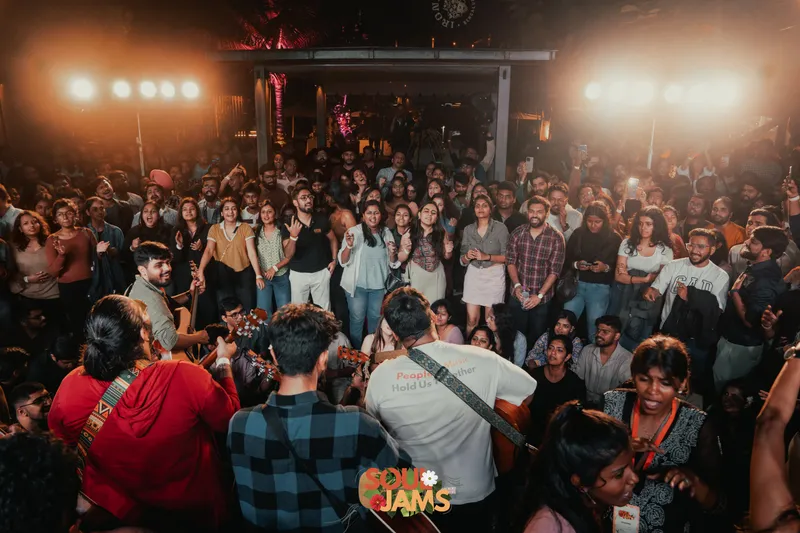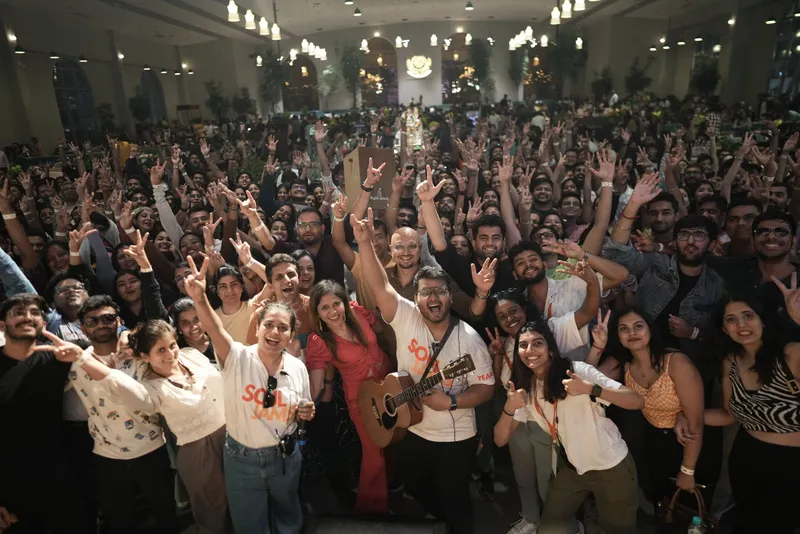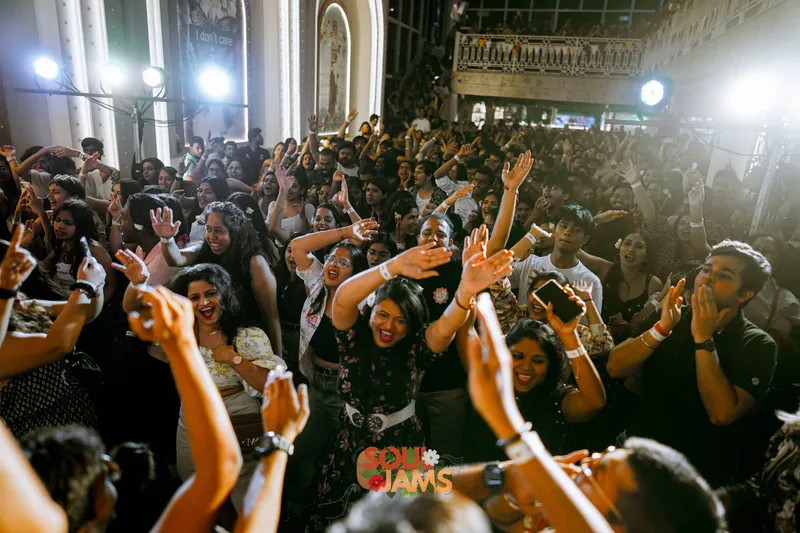Sing along: How this open-mic music community is bringing jamming enthusiasts and music lovers together
At Soul Jams, music lovers, amateur guitarists, bathroom singers and sundowner fans come together to create a community cherishing their favorite songs.
Imagine the setting—a sundowner on top of a mall terrace where you are jamming on the best parts of the catchiest Bollywood songs with a bunch of strangers united by their love for music.
This is how Bengaluru-based Soul Jams celebrated its second anniversary at the terrace of 1 MG Lido Mall, in June this year.
Since its inception in May 2022, Soul Jams, an artist collective, music community and events startup, has conducted close to 53 shows across Bengaluru, and it now has its sights set on Delhi, Hyderabad, and Mumbai.
Soul Jams was built with the idea to give a stage to amateur artists, or anyone who had a keen interest in music, in a way that allows everyone to get involved.
“When I first came to Bangalore, I realised there were a lot of skill barriers. If somebody was really good at music, they could easily find a set, an audience, and a group of people to jam and collaborate with. But for people who just generally love music and were probably in the process of learning, there weren’t a lot of opportunities,” Ajay Varghese, Co-founder at Soul Jams tells YS Life.

How does it work? We ask.
Soul Jams events start with a lineup of amateur musicians, who try their hand at their favourite songs across genres and languages. This is followed by a jamming session where everyone brings their instruments and their throats to sing along.
“We are looking to create an experience that ensures the participants associate us with something more than passively consuming music,” tells Varghese on their founding idea of bringing people together in an open space allowing them to sing with all their might—partly a reason why these jamming sessions are hosted in alfresco breweries and restobars.
Budding music enthusiasts who want to perform have to fill a form ̧beforehand, send in small video audition and buy a ticket, which usually ranges between Rs 400 and Rs 800. While the criteria for skills aren’t particularly high, the group focuses on giving an opportunity to new people every session.
Sunburn Goa 2024: Here’s why India’s largest EDM festival is struggling to finalise a venue
“When I first moved to Bangalore for my job, live music communities went only as far as open mic gigs with a random set of people. While, you would still find some opportunities here and there but it never felt a wholesome music experience and the energy wasn’t great,” says Harikrishnan B who started volunteering by playing and performing at Soul Jams.
With an audience count of just 25, Varghese and his co-founder Nishtha Barthakur, hosted their first Soul Jams in May 2022. Within 18 months, they have managed to scale the gathering to 800-1000 people per session. By October last year, they managed to capture the attention of Zomato who joined them as a ticketing partner.
The collective has sold more than 20,000 tickets so far. As far as really cool records go, Soul Jams managed to sell 120 tickets in a minute.

After scaling it to an event with 1,000 attendees, the founders realised that the experience only works in a slightly intimate setting. Since then, they have re-aligned their focus to creating a more hyper-local experience with smaller jamming communities across the city.
They launched WeJams in July this year, an affiliate IP for Soul Jams which conducts jamming sessions at a slightly smaller scale. It currently operates seven WeJams across Bengaluru mostly hosted at Gillys Resto Bars and Socials across town but plans to scale all its IPs to 23 cities by the end of next year.
“Communities are only built when you meet people again and again,” says Varghese, explaining the group’s rationale on shifting towards a hyperlocal approach. This ensures that they cover more ground in terms of hosting multiple jamming sessions on the same day. Also, it makes it easier to find appropriate venues and keep the experience intimate.
They also designed a front-runner community, people who would be the face of the show and responsible for audience experience including emcee-ing, backup instruments and greeting, among others. This presents a unique opportunity for volunteers to upskill to other instruments and hone their interpersonal skills.
“I used to just play a little bit of guitar before I joined Soul Jams. After volunteering and hosting for a while, I have added instruments like keyboard and Cajon to my skillset as well. Moreover, a chance at hosting these We Jams sessions have also helped me find my own style of emcee-ing and running the event,” says Harikrishnan, a Bengaluru-based former recruiter with Walmart.
He started volunteering at jamming gigs as a way to get a breather from the daily corporate grind, and has now launched his own band, Ruh Band, with folks he met at these jamming sessions.

While Soul Jams started with an aim to create a community of music lovers and jamming enthusiasts, it still has its sights set on creating a viable business model with the right economics, especially in a sector that is notorious for having razor thin margins.
Going ahead, along with geographical expansion, Soul Jams is also looking to tap into a collaborative model with music labels and budding artists with a promise of dedicated stage time in a bigger lineup.
Its latest hyper-local approach, efforts in increasing its footprint, along with its plans to tie up with record labels and established artists, are expected to enable the company to last longer from its peers which includes names like Jam Along and Let’s Jam.
“We were selling without an artist, just with a brand name called Soul Jams. People came because they knew that they were going to have fun and they did not care who was performing that day. They came for themselves,” explains Varghese.
Edited by Affirunisa Kankudti







